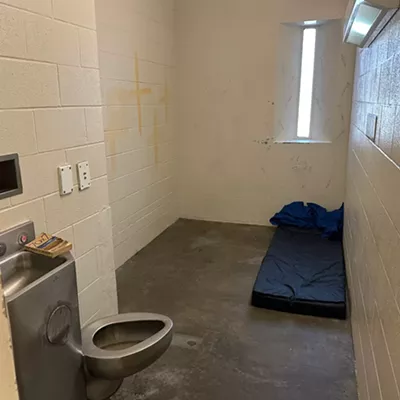
There are hundreds of pages detailing allegations of sexual assault and harassment inside the Spokane County Jail. The investigatory records lay out accusations involving both inmates and staff.
But we can't see them. Neither can you.
Spokane County has categorically denied the Inlander's request for investigations related to the federal Prison Rape Elimination Act (PREA) dating back to 2010, citing a section of state law that requires jail operators to keep records of inmates confidential.
An appeal of Spokane County's denial was also swatted down by Steve Kinn, the county's public records officer. In his denial, Kinn cites a statute outside the Public Records Act that says "the records of a person confined in jail shall be held in confidence."
Kinn explains that records held "in confidence" are different from exemptions to the public records law, and cannot be released even with redactions.
But Spokane County's interpretation of the law conflicts with at least three other counties in Washington state and even with one of its own offices. That interpretation hinders the public's ability to evaluate the quality of the investigations.
Lincoln County has released five investigations related to sexual assault and harassment in its jail dating back to 2015. Pend Oreille County has released one investigation from 2013. Both counties released these documents with the names of inmates and staff members redacted.
In Lincoln County, for example, a female inmate accused a jail officer of propositioning her to flash her breasts in exchange for tobacco, according to investigatory records. The inmate also told a Lincoln County investigator that the jail officer grabbed her butt and kissed her in a location hidden from security cameras. The woman said she told her cell mate at the time, who shared a similar experience with the same officer.
"She said that neither of them wanted him to get into trouble," the investigator writes in a report. "She said she recalled that the two of them said that he probably does it to all of the women."
The report released by Pend Oreille County details a female inmate's accusations that a male inmate exposed himself to her and masturbated into a rubber glove.
"I couldn't deal with it. It makes me embarrassed. I'm sorry," she told the investigator.
The man, whose name is redacted, denied the allegations when questioned.
Two facilities in King County have not yet released PREA investigations, though records officers for the South Correctional Entity Regional Jail in Des Moines and the King County Correctional Facility say the records are releasable after name redactions.
Additionally, the Spokane County Sheriff's Office recently released an investigation into one of the county's corrections officers, who was accused of having sex with a female inmate. The names in those reports were also redacted.
Spokane County Sheriff Ozzie Knezovich has previously said the investigation was tainted from the get-go because the jail, which is overseen by the County Commission, did not immediately forward the case to detectives and instead investigated one of their own.
The officer has not been charged with a crime.
Despite the fact that other counties are releasing investigatory records, Kinn says he stands by his position.
Nancy Krier, Washington state's assistant attorney general for open government, says it's not unusual for agencies to come to opposing interpretations of open records laws and exemptions, especially when those laws have not been fine-tuned by judges.
"Neither one is necessarily wrong," she says. "The code lacks precision."
Krier and Kinn point to a case from Okanogan County, which was decided the state Court of Appeals in April.
The appeals court ruled that state law protects audio recordings of inmates' phone calls from being released to the public. Judge George Fearing writes that the law requires agencies keep confidential all "records prepared as a result of the inmate being in jail." ♦




















